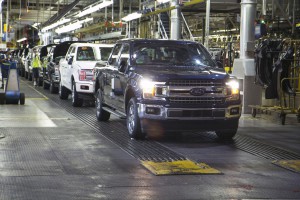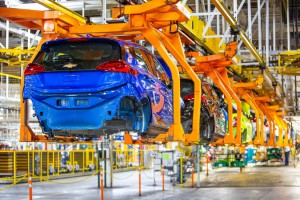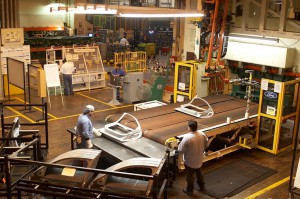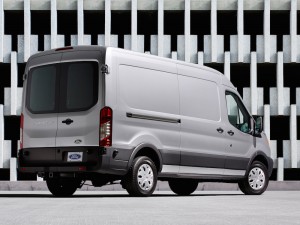Just days after saying it would miss an earlier March 30 deadline, Ford Motor Co. now says it is “aiming” to reopen some of its “key” North American plants as early as April 6.
Ford, along with virtually all automotive manufacturers, began shutting down its manufacturing operations last week due to the coronavirus pandemic. Most originally planned to get back into operation by the end of March. But that target has largely been scuttled by the increasing number of cases of Covid-19 – the disease caused by the virus – and the rapidly growing list of states and communities now under lockdown.
A General Motors spokesman said Thursday morning there is no “firm return to work dates at this time,” while a number of other carmakers, such as Toyota, plan to review their start-up plans over the next couple days.
“Ford is aiming to restart production at select plants in North America as early as April 6, bringing key plants back online while the company introduces additional safety measures to protect returning workers,” said Kumar Galhotra, Ford’s president of North America.
(Ford’s credit rating plunges into junk territory.)

The Dearborn Truck plant will be one of several to follow on April 14, if Ford sticks to the new schedule.
At the moment, only one North American factory is scheduled to start up on that date, Ford’s Hermosillo Assembly Plant in Mexico set to resume operations on a single shift. On April 14,Galhotra added in a statement, production is scheduled to resume at four other assembly plants in the U.S.:
· The Dearborn Truck Plant;
· The Kentucky Track Plant;
· The Ohio Assembly Plant; and
· The Kansas City Assembly Plant – which will resume production only on its Transit van line.
All of these produce high-demand pickups, utility vehicles and commercial vans like the Transit. To support the resumption of production, Ford also announced at least the partial start-up of a number of additional engine, transmission, stamping and other component factories, such as the Dearborn Stamping Plant near it world headquarters.
The automaker said it “will continue to assess public health conditions, as well as supplier readiness and will adjust plans, if necessary.”
The timing of the production restart is clearly influenced by several factors, including current stay-at-home orders that now cover tens of millions of Americans. Ford’s home state of Michigan enacted such restrictions on Tuesday and they don’t expire until April 13.
Though the start-up of the Hermosillo plant would meet the target Pres. Donald Trump this week laid out to get Americans back on the job by Easter, that factory is in Mexico. Ford’s partial resumption of production in the U.S. would come two days after the holiday – if the automaker follows through.
It is expected to face strong pressure from the United Auto Workers Union to ensure the safety of the thousands of U.S. workers who will be called back.
Spokesman Brian Rothenberg responded to the news by saying the UAW is reviewing Ford’s announcement “with great concern and caution.”
A veteran line worker at one of Ford’s main Detroit-area plants responded with skepticism and concern, noting “quite a few employees from my plant are symptomatic” of Covid-19 but are having trouble getting tested. The hourly employee – who asked not to be identified by name or specific plant – warned that there might not be “enough people to run” the plant if they all eventually test positive.
(Analysts warn auto sales forecasts looking dire.)

GM says its plans are fluid and it is not yet ready to announce plans to restart production at plants like the one in Orion Twp, Michigan producing the Chevy Bolt EV.
Ford’s announcement is the latest twist in an ongoing industry saga. The second-largest of the Detroit Big Three first ordered non-manufacturing employees to start working from home before also deciding to shut down its factories. GM, Fiat Chrysler and others quickly followed.
The closures clearly reflected concerns about the rising number of Covid-19 infections. A Ford employee was the first person to die in Michigan. Two FCA line workers have now succumbed, as well.
But there is another reason that automakers were willing to halt production. U.S. new vehicle sales have been tumbling rapidly in recent weeks and are expected to be off around 40% for the month, according to J.D. Power, and could fall 50 to 60% in April. As a result, there had been a rapid build-up in unsold inventory on dealer lots.
“The demand is just not there,” said Scott Vazin, head of U.S. public relations at Toyota.
The build-up is something Toyota and others plan to factor in as they decide when to reopen, along with concerns about worker health.
(GM taps credit lines to guard against economic impact of pandemic.)
For now, “The situation is fluid and can change week to week,” GM said in a statement. “We don’t have firm return to work dates at this time.”
FCA said in an e-mail it had no update of its own plans.
In recent months, Ford has been particularly hard hit by not only the coronavirus pandemic but other issues such as weak sales. The automaker ordered a major shake-up in its senior management team in early February. Its stock price is approaching lows not seen since the Great Recession and, on Wednesday, Standard and Poor’s dropped its credit rating to junk status.


